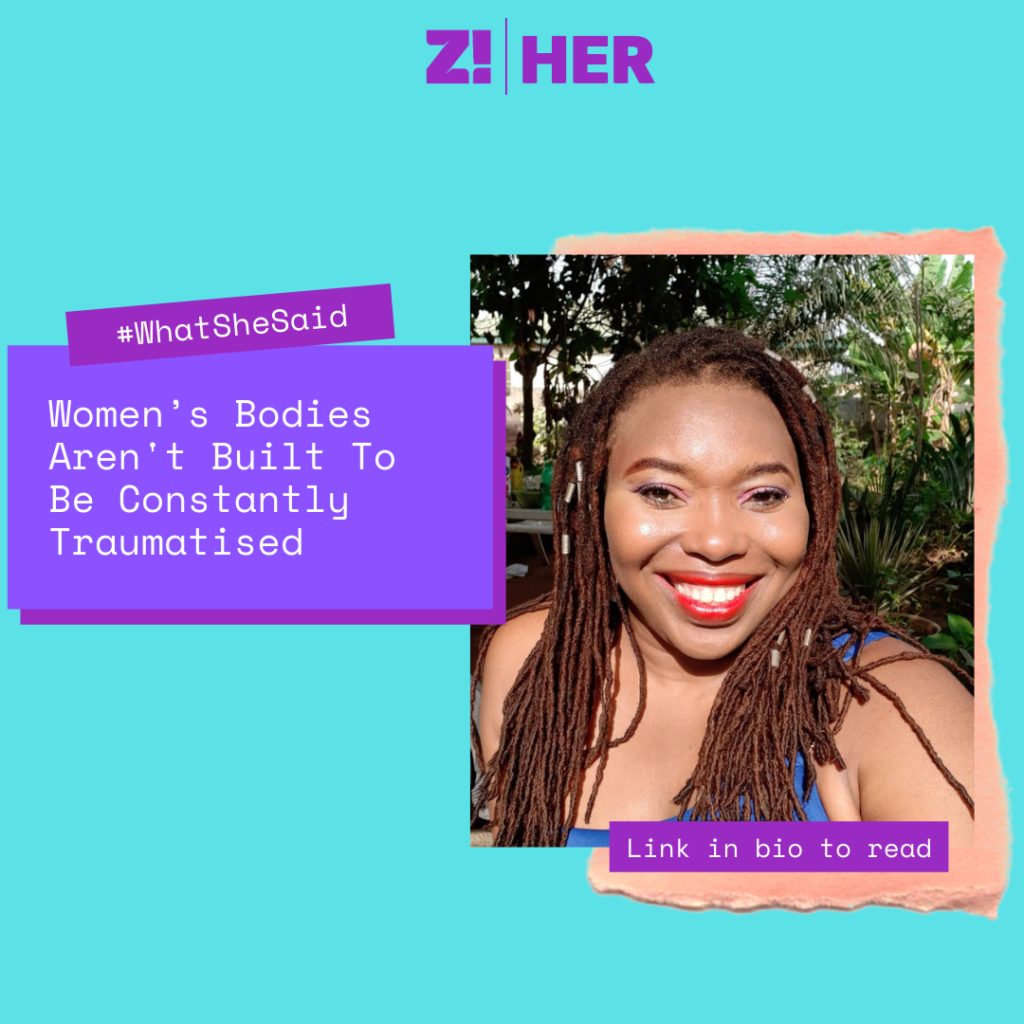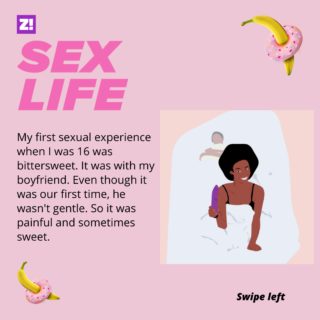The subject of this week’s What She Said is Ijeoma Ogwuegbu, a Nigerian woman who was diagnosed with Fibromyalgia, a condition that causes widespread pain all over the body. She talks about how difficult it was to get a diagnosis, coping with it while raising three children and how music helps her escape.

When did you first notice something was wrong?
I first noticed two years ago, in the first week of January, 2019. I was going through a lot emotionally — my marriage had just ended and I was attempting to move forward. That week, I felt a stabbing pain in my back and couldn’t move my right arm. It was really odd. This wasn’t something that had never happened to me.
That weekend, my sister and kids were in the living room, so I sent my sister a text to come to the room. Seeing my face, she knew something was wrong. She tried to move my arm, and it was hell. She called our other sister who lived nearby to come and drive me to the hospital. When we got there, the doctor looked through my records and said, “You complained about something like this about this time last year.” I didn’t even remember that. He gave me muscle relaxers and said to go home and rest.
What happened next?
The next Monday, I felt an electric shock going from the top of my head down. From then on, I was always in constant pain.
Oh wow. When did you eventually find out what was wrong?
Almost a year later. So, for about a year, I didn’t actually know the problem. I did different scans and tests, but they couldn’t identify the problem. My test results always came back fine.
To determine that it was in fact fibromyalgia, they had to do an elimination process where they ticked every other thing before coming to the conclusion. And up until this diagnosis, the pain kept getting worse. It got so bad that I couldn’t move my body.
Did they tell you what caused it?
Generally, there are two known causes of fibromyalgia: psychological trauma and physical trauma. I know I didn’t have physical trauma before this time. However, I had some psychological trauma from getting separated. So when I got the diagnosis, I knew it wasn’t completely out of the blue. The thing is, If you keep pushing emotional stress down and thinking it has gone, you’re wrong. It’s inside your body, and fibromyalgia will basically tell you: “Guy, you can’t keep stuffing these things here, your body will break.”
When you don’t deal with physical and psychological trauma at the time they happen, your body stores them up. Then the pain receptors in your body will break down and stop functioning properly. Your brain will begin to interpret every single thing as pain. You won’t be able sleep properly, you’ll be tired all the time. In fact, you’ll constantly be in pain.
Wow. I’m so sorry. Is there a part of your body that suffers more than the rest?
My limbs. I now walk with a walking stick, but I’m looking forward to getting an electric wheelchair.
I’m curious about the journey to getting diagnosed. What was your experience with doctors like?
I went from hospital to hospital between January and March but couldn’t get any help. Then I went to LUTH. In the first meeting I had in LUTH, I tried to explain the electric shocks I was experiencing anytime I put my foot down, but the doctor didn’t get it.
Eventually she said that what I was experiencing could be due to family issues I was having at the time and recommended that I needed to relax. She also prescribed antidepressants. I was a bit disturbed by this initially, but honestly, I needed them at that time. I had previously been diagnosed with depression and anxiety but had never done anything about it.
Using the antidepressants made me feel better. I didn’t feel as much pain on one hand. And on the other hand, I was seeing the world differently and was quite shocked. My brain is usually switched on and constantly evaluating my actions and everyone else’s. But with antidepressants, I realised that wasn’t the way the world was. It was a big ah-ha moment for me.
Did the antidepressants stop working to treat the pain?
Yes, it did. After about a month or two, the pain was back. However, because the use of the antidepressants gave me clarity, I was able to advocate better for myself. I knew that the antidepressants were not the solution to the pain. So I did more tests and eventually got diagnosed.
After being diagnosed, what kind of support did you receive from your family?
Even before I was diagnosed, they were there for me. I come from a really large, loud and boisterous family. I have five sisters and three brothers. My parents are alive. They were there for me all step of the way. My mother and sister moved in with me. My entire family treated the condition as a thing that happened to all of us. I never had to worry about my kids.
That’s good. How do you cope with the pain?
I’m not religious, but I’m a spiritual person. The way I experience spirituality involves a lot of physicality. I listen to music and can feel my body responding to it.
Because I’m constantly in excruciating pain and can’t move — fibromyalgia doesn’t want you to move, exercise or maintain a peaceful existence — I had to utilise music and sound in some way. Music generally opens up a folder of memories. So when I listen to music, I revisit the parts of my life that were positive and meaningful in some way and bring them to my present. I love Abba. When I listen to Abba, I remember all the joyful and blissful moments I spent with my siblings as kids. So these days, I listen to Abba with my children and all the pleasant memories come to my mind.
What about medication?
Very few medications work. You can’t use opioids for long because of dependency issues. So you have to figure out how to live your life with that amount of pain. That’s why music and movement are important to me. When I move, I immediately start to feel light — I’m not thinking about how I look or how someone else will perceive what I’m doing. My muscles will scream at me to stop, but if I keep going, then my body will loosen up and I’ll feel peaceful. I do this for about 15 minutes. And for the next hour or two, I feel lighter, like a weight has been lifted.
I’m not a fan of suffering, that’s why this is escaping through music and movement are important. There’s no place where they wrote my name next to “sufferhead.” I have fibromyalgia and that’s enough stress for 25 people and three lifetimes. No need to add anymore suffering on top.
Haha.
In fact, this is what I was thinking of when I created this thread. Two people, a man and a woman, came together and had children. One person has already used all her body and mind to have the babies. Yet, you who were involved in it, feel it’s okay to go on and live your life, leaving the children with her. People think that the mother and father are equal — 50: 50 — when raising children, but it’s not true.
The woman is already deficit because she’s spent nine months carrying the child. Her body is broken. The first three months after I had my child, I was just like, what the fuck is this shit? It is the absolute ghetto. Let’s not even talk about what happens to the woman’s body when she’s pregnant or what happens when you step out of the hospital with your child. You don’t love the child yet, because that child has crashed and burned your body to come out. It’s only normal if the first thing you think is “I don’t know what I feel about you right now.” You just know there’s something between you and your child.
There’s literally nothing to compare the pain of pregnancy to. Unfortunately, women don’t get the time to acknowledge and process what happened. You’re not even allowed to contemplate it in any serious way. You’re expected to bounce into motherhood. Then you start breastfeeding which is another torture.
But we’re supposed to experience all the stages of pregnancy and childbirth in pure and unbridled ecstasy. This idea of just moving on to the next thing forces us to drink so much trauma. We have normalised it so much that you’re the odd one if you question it.
With all of these in mind and the fact that you’re divorced and living with fibromyalgia, what’s it like raising your children?
I simply don’t have the time to do a lot of things. In a day, I might get just one hour to be active. All of this has forced me to be so conscious about even the smallest interactions and how it contributes to my wellbeing and my children’s well being. I hardly fly off the handle because I’ll probably say something that’ll hurt them even though I don’t intend to. At that moment, I’m not myself. So when I am annoyed with them, I ask them to leave, so I can process what happened, think of my reaction and then react.
We play music in the evening after their classes and sometimes, spend an entire day doing that, since mummy cannot jump up and down. Fibromyalgia forces me to consider my needs, their needs and how to make both work, rather than dwelling too much on could haves or would haves.
How has it affected working?
This is the hardest part. I’ve always been a writer. Because of how crippling the condition is, it is difficult to do any kind of sustained work. Fibro fog is an aspect of fibromyalgia that affects your memory. Short term memory isn’t saved as well as it should. You forget names, conversations, meetings and other details you should know. So I can’t write and even if I try, joint and muscle pain in my hands is another challenge.
A while ago, I started gardening because I was depressed. I also had a gardening group. I can’t garden or manage the group because of fibromyalgia.
On the other hand, fibromyalgia has forced me to focus and ask myself, if I can’t do what I used to do, what can I do? That’s how I became a painter. There’s a sense of freedom I get when I’m painting. I might never have discovered painting if this didn’t happen. Once I start doing something, I will become So immersed in it until I know everything about it.
Currently, I’m script editor on Tinsel. They’ve given me a lot of concessions to be honest. We definitely need companies to start to think of their people beyond being a bottom line feeder.
What are the peculiar ways in which fibromyalgia affects women?
Women are more likely to have fibromyalgia than men. And I feel it’s because of all the ways in which we internalise trauma and are okay with it. That’s why so many women have fibromyalgia. It’s basically your body saying it’s enough — o ti to. In hindsight, I realise all the times when my body was trying to get my attention. We women end up treating our bodies in ways it’s not built to handle. Your body is not built to be constantly traumatised.
Then there’s the fact that the things we go through in Nigeria are not normal. We are so used to it that we have dehumanised ourselves. We don’t deal with the anger and the rage, but it’s still somewhere, either inside of us or we’ve transferred it to someone else to deal with.
Living with fibromyalgia has made me realise that I just want to have positive energy around me and transfer that positive energy to other people and by doing this, somehow improve the world. Even if it’s just for one person. I don’t have energy.
One important thing I learned from my mother is that valuing yourself. My mother was very clear that she deserved to be happy. She valued herself. Women need to know that we don’t need the trauma. We have value just by being here. Eyan nla ni e. We don’t need to break ourselves and our bodies to be anything.
For more stories like this, check out our #WhatSheSaid and for more women like content, click here


 (@IjeomaOgood)
(@IjeomaOgood) 


